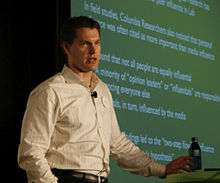Duncan J. Watts
| Duncan Watts | |
|---|---|
 Watts presenting at iCitizen 2008 | |
| Born |
Duncan James Watts February 20, 1971[1] Guelph, Ontario[1] |
| Residence | New York City |
| Nationality | Australia |
| Alma mater |
University of New South Wales Cornell University (PhD) |
| Known for |
Watts and Strogatz model Six Degrees: The Science of a Connected Age[2] |
| Scientific career | |
| Fields | Sociology, network science |
| Institutions |
Columbia University Microsoft Research Santa Fe Institute Yahoo! Research Nuffield College, Oxford[3] |
| Thesis | The structure and dynamics of small-world systems (1997) |
| Doctoral advisor | Steven Strogatz[4] |
| Website |
research |
Duncan James Watts (born 1971) is a sociologist and principal researcher at Microsoft Research, New York City known for his work on small-world networks.[5][6][7][8][9][10][11][12][13]
Education
Watts received a Bachelor of Science degree in physics from the University of New South Wales and a Ph.D.[1] from Cornell University, where his advisor was Steven Strogatz.
Career
Watts was past external faculty member of the Santa Fe Institute and a former professor of sociology at Columbia University, where he headed the Collective Dynamics Group.[14] He is also author of two books. His first, Six Degrees: The Science of a Connected Age[2] is based on the six degrees research in his 1998 paper with Steven Strogatz, in which the two presented a mathematical theory of the small world phenomenon.[15] His second book, Everything is Obvious *Once You Know the Answer: How Common Sense Fails Us,[16] explains common errors people make when making decisions especially for groups or organizations, and suggests alternative methods using research and data. He also presents some of his research from Yahoo and Microsoft, and comments on the work of some popular nonfiction writers like Malcolm Gladwell.
Until April 2012, he was a principal research scientist at Yahoo! Research, where he directed the Human Social Dynamics group.[17] Watts joined Microsoft Research in New York City by its opening on May 3, 2012.[18][19]
Watts describes his research as exploring the "role that network structure plays in determining or constraining system behavior, focusing on a few broad problem areas in social science such as information contagion, financial risk management, and organizational design."[20] More recently he has attracted attention for his modern-day replication of Stanley Milgram's small world experiment using email messages and for his studies of popularity and fads in on-line and other communities.
References
- 1 2 3 Watts, Duncan James (1997). The structure and dynamics of small-world systems (PhD thesis). Cornell University.
- 1 2 Watts, Duncan (2003). Six Degrees: The Science of a Connected Age. W. W. Norton & Company. ISBN 0-393-04142-5.
- ↑ "Everything is Obvious". Everything is Obvious. 2018-04-23. Retrieved 2018-07-08.
- ↑ Duncan J. Watts at the Mathematics Genealogy Project
- ↑ Watts, D. J. (1999). "Networks, Dynamics, and the Small‐World Phenomenon". American Journal of Sociology. 105 (2): 493–527. doi:10.1086/210318.
- ↑ Watts, D. J.; Dodds, P. S.; Newman, M. E. (2002). "Identity and Search in Social Networks". Science. 296 (5571): 1302–1305. arXiv:cond-mat/0205383. Bibcode:2002Sci...296.1302W. doi:10.1126/science.1070120. PMID 12016312.
- ↑ Watts, D. J. (2002). "A simple model of global cascades on random networks". Proceedings of the National Academy of Sciences. 99 (9): 5766–5771. Bibcode:2002PNAS...99.5766W. doi:10.1073/pnas.082090499. PMC 122850.
- ↑ Dodds, P. S.; Muhamad, R.; Watts, D. J. (2003). "An Experimental Study of Search in Global Social Networks" (PDF). Science. 301 (5634): 827–829. Bibcode:2003Sci...301..827D. doi:10.1126/science.1081058. PMID 12907800.
- ↑ Watts, D. J. (2004). "The "New" Science of Networks". Annual Review of Sociology. 30: 243–270. doi:10.1146/annurev.soc.30.020404.104342.
- ↑ Dodds, P.; Watts, D. (2004). "Universal Behavior in a Generalized Model of Contagion". Physical Review Letters. 92 (21). arXiv:cond-mat/0403699. Bibcode:2004PhRvL..92u8701D. doi:10.1103/PhysRevLett.92.218701.
- ↑ Watts, D. J. (2005). "Multiscale, resurgent epidemics in a hierarchical metapopulation model". Proceedings of the National Academy of Sciences. 102 (32): 11157–11162. Bibcode:2005PNAS..10211157W. doi:10.1073/pnas.0501226102. PMC 1183543. PMID 16055564.
- ↑ Duncan J. Watts's publications indexed by the Scopus bibliographic database. (subscription required)
- ↑ Clive Thompson (February 2008). "Is the Tipping Point Toast?". Fast Company. Retrieved 2008-02-25.
- ↑ CDG Collective Dynamics Group Archived 2005-04-02 at the Wayback Machine.
- ↑ Watts, D. J.; Strogatz, S. H. (1998). "Collective dynamics of 'small-world' networks" (PDF). Nature. 393 (6684): 440–442. Bibcode:1998Natur.393..440W. doi:10.1038/30918. PMID 9623998.
- ↑ Watts, Duncan (2011). Everything Is Obvious: *Once You Know the Answer: How Common Sense Fails Us. New York: Crown Business. ISBN 0-385-53168-0.
- ↑ AllThingsDigital (2012-04-29). "Aussie social-network researcher exits Yahoo". Herald Sun. Retrieved 2018-07-08.
- ↑ Floridia, Richard. "Why Microsoft Chose New York City", The Atlantic: Cities, 2 May 2012. Retrieved on 8 May 2012.
- ↑ Knies, Rob. "Microsoft Research Microsoft Research Debuts N.Y.C. Lab", Microsoft Research, 7 May 2012. Retrieved on 8 May 2012.
- ↑ Home page of Duncan Watts at Yahoo Research Archived 2009-11-28 at the Wayback Machine.